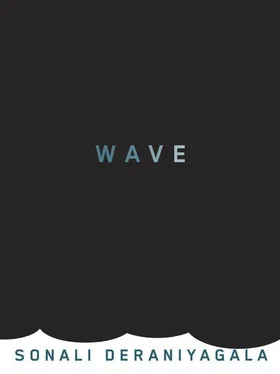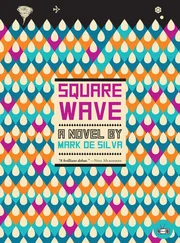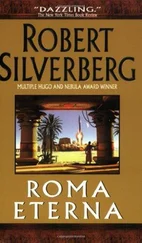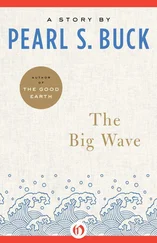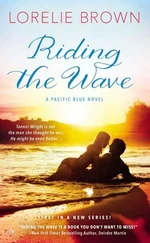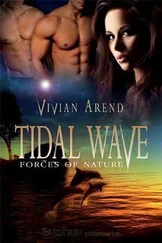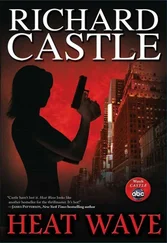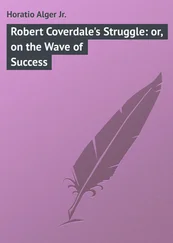This was my first trip back to Yala. I went with Steve’s father, Peter, and his sister Jane. On the two-hundred-mile drive from Colombo, we had to stop often, so I could vomit.
The wind was fierce that day we went back, it flung sand into our faces. A strangely quiet wind, though, bereft of the rustling and shaking of trees. It was midday, and no shelter from the seething sun. The sea eagles that had thrilled Vik, they were still there. Bold in this desolation, they sailed low, sudden shadows striking the bare ground. Eagles without Vik. I didn’t look up.
I couldn’t make this real. This wasteland. What has this got to do with me? I thought. This was where I was last with my family? Our wine chilled in a bucket here on Christmas Eve? I couldn’t believe any of it, for I couldn’t grasp their extinction.
I had learned some facts by now, so I recited them in my head. The wave was more than thirty feet high here. It moved through the land at twenty-five miles an hour. It charged inland for more than two miles, then went back into the ocean. All that I saw around me had been submerged. I told myself this over and over. Understanding nothing.
I knew the geography of this hotel so well — but now I was directionless. Where do I go? What did I come here to see? Then I remembered the rock. There was a large rock here on the bank of the lagoon that is to the side of the hotel. A black, peaceful rock that we’d often sit on at dusk. Every year we took photos of the boys on that rock. I had to search awhile before I saw it now, it wasn’t where it used to be. It was in the middle of the lagoon. Had it moved, or had the lagoon expanded? I couldn’t tell. But with that rock I found my bearings. These concrete pillars held up the dining room. Over there, behind that mound of crushed concrete, was the pool. The rooms we stayed in were at the farthest end, near to the jungle, and at night we heard wild boar steal out of the scrub.
I showed Steve’s father and sister those rooms. They stared silently at the floor of the bathroom, where Steve was when I saw the wave. I retraced the path we took as we ran from the water. I showed them the driveway where we climbed into the jeep. We stood on that gravel awhile. I kicked up red dust.
I noticed objects wedged in the top branches of a large acacia, one of the few trees still upright. An airconditioning unit, a pink mosquito net, the number plate of a car. And in the rubble on the ground, I could see a Japanese magazine now dried to a curl, a room-service menu, a broken wineglass, a black high-heeled shoe. A child’s red underpants. My eyes rushed past this. I didn’t want to find anything that was ours.
I walked down to the ocean alone. It was June, when the surf here is wild. I stared. These waves, this close. I stood there taunting the sea, our killer. Come on then. Why don’t you rise now? Higher, higher. Swallow me up.
When I came back to my father-in-law, he was holding a sheet of paper, peering at it. He showed it to me. He told me he’d stood in that wind and spoken a few words into the air, to Steve and the boys. That’s when something fluttered by his foot. He took no notice. It was just a scrap of paper, mostly covered in sand, some old newspaper, he thought. With each gust of wind, it kept flapping. So he dug it out. It was a laminated page, A4 size. Could this be something of Steve’s? he asked.
I looked. And I looked. My blood jumped. For it was.
It was the back cover of a research report written by Steve and a colleague. A report on “using random assignment to evaluate employment programs,” published in London in 2003. The ISSN number was still clear on the bottom left. Except for a small tear in the middle, this page was intact. It had survived the wave? And the monsoon in the months after? And this relentless wind? It appeared right by Steve’s father’s foot? It rustled? Random assignment. I remembered the many studies that Steve had been working on, these two words absurd in this madness now. Had Steve been reading this on the toilet when I shouted to him? Was this one of the last things touched by his hands? I clasped the paper to my chest and sobbed. My father-in-law stood next to me. “Cry all you want, sweetheart.”
After finding that page, I was no longer afraid of chancing upon our belongings amid this rubble. Now I wanted to discover more. I kept going back to Yala, obsessively, over the next months. I scavenged the debris of the hotel. I searched, dug about, scratched my arms on rusted metal. I pounced on fragments of plastic, did this come from one of our toys? Is this Malli’s sock? What I really wanted was to find Crazy Crow, the big glove puppet with unruly black feathers that we had given Malli for Christmas, the day before the wave. When he tore open the wrapping and saw it, how he’d lit up.
I followed the course of the wave inland, time and again. In a trance, I scrambled through the uprooted scrub. The jungle had been devoured by the water, vast tracts of it were now covered in bone-white sea sand that had been swept in by the wave. I ignored danger and walked far into the forest, there were wild animals — elephants, leopard, bear. I lied to my unsuspecting friends from London who sometimes came with me. “Are you sure this is safe?” “Yeah, course it is, come on.”
Nothing was normal here, and that I liked. Here, in this ravaged landscape, I didn’t have to shrink from everyday details that were no longer ours. The shop we bought hot bread from, a blue car, a basketball. My surroundings were as deformed as I was. I belonged here.
I kept returning over the next months and saw the jungle begin to revive. Fresh green shoots sneaked out from under crushed brick. New vines climbed around tilting pillars, and these ruins suddenly looked ancient, like some holy site, a monastery for forest monks, perhaps. Around our rooms a scattering of young ranawara bushes dripped yellow blossoms. And everywhere, on bare ground and between cracks in the floors, tiny pink and white flowers that flourish along the seashore forced their way up. Mini mal , or graveyard flowers, they are called. I resented this renewal. How dare you heal.
Still, I began to experience a new calm. In Colombo my chest cramped continuously, here that pain lessened. I lay on the warm floor of our hotel room as a slow moon scaled above the sea, and I could breathe. At the edge of this floor, there was a small bolt-hole, filled with sand. When I saw the wave coming toward us, I asked Vik to shut the back door. It was into this bolt-hole that he pulled down the lock. Now I traced its rim with my fingers. I cleaned out the sand.
We loved this wilderness. Now slowly it began pressing into me, enticing me to take notice, stirring me from my stupor, just a little. And here I found the nerve to remember. I’d walk on the beach following the footsteps of a solitary peacock, and allow in snatches of us. I could see Vik and Malli catching hermit crabs on this beach. They’d keep the crabs in a large blue basin that they’d landscaped with sand tunnels and ditches, then release them by the water’s edge at the end of the day. Now I could hear the two of them, their innocence twinkling in the late-evening light. “Have I been good, Mum, and will Santa bring me lots of presents?”
I had glimpses of those hours before the wave. Vik jumped on my bed. “Come give me cuddle,” I said. “A Boxing Day cuddle?” he asked, snuggling up. We were to check out of the hotel soon, my mother would have had her vanity case packed. I remembered our last night here, a star-sprawled sky. “Look, Dad, the sky has got chicken pox.” We were sitting outside on the sand, the air was still, from the mayila trees, like a marble skipping on stone, a nightjar called. A fucking nightjar? When I needed a vast pronouncement, of what was looming. The end of my world.
Читать дальше
